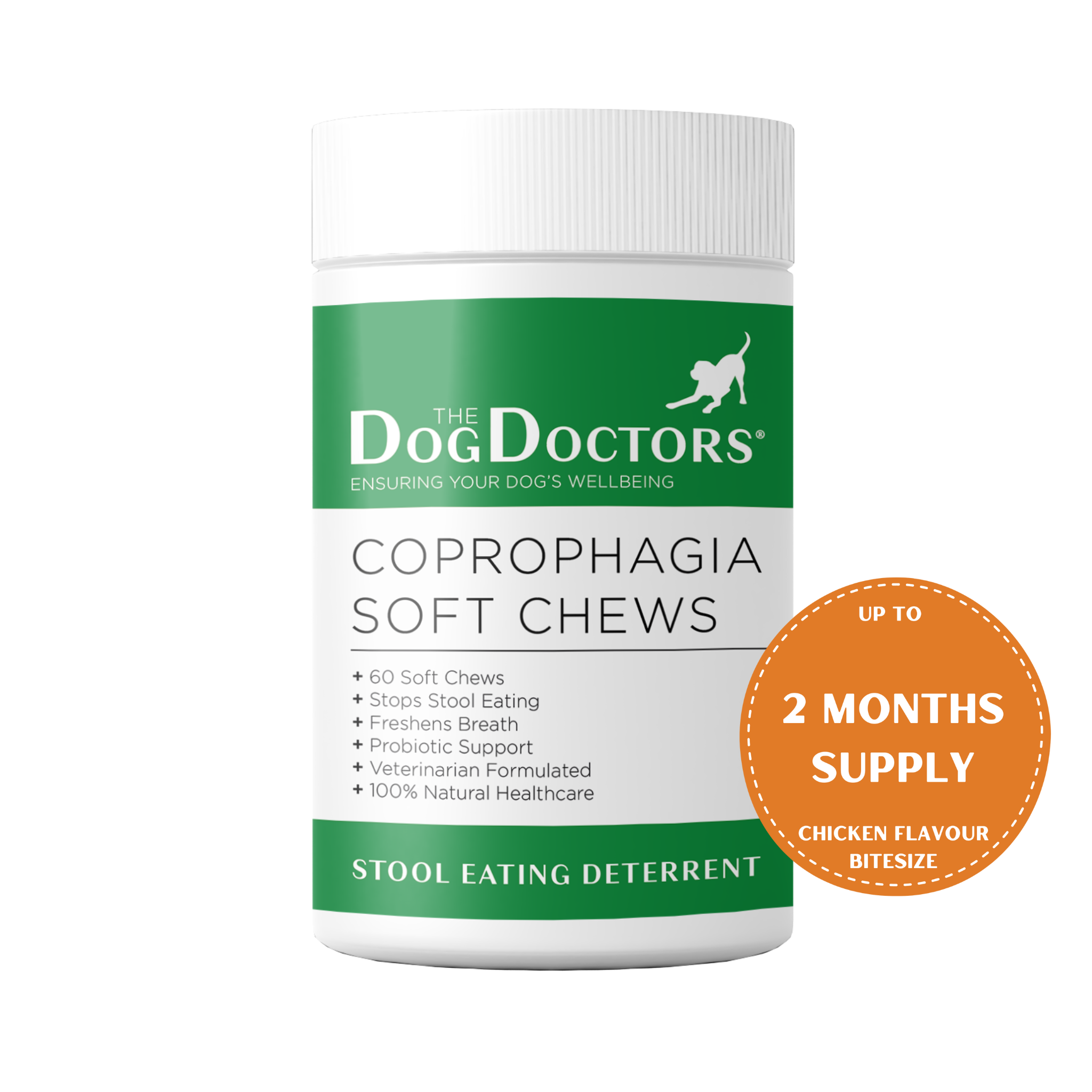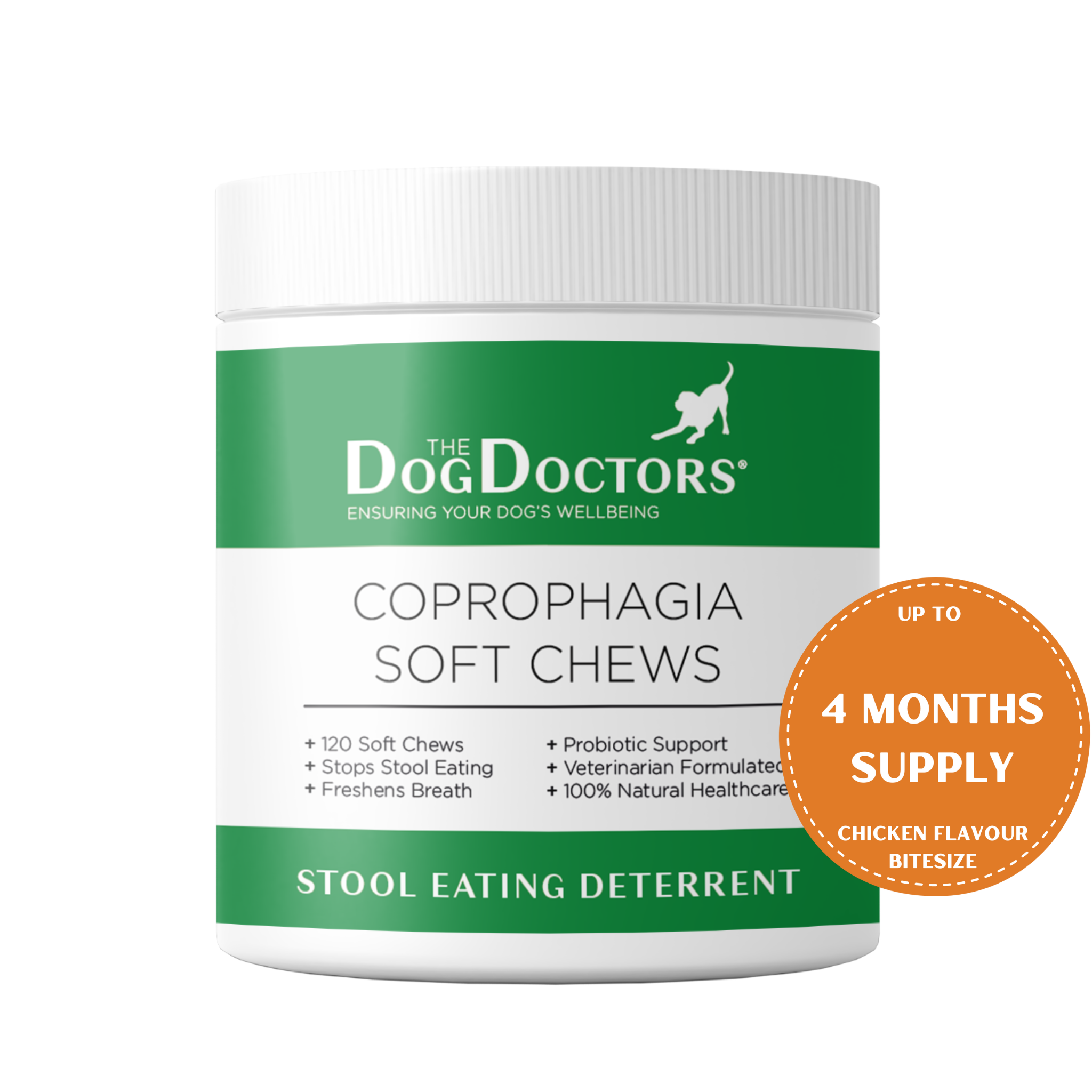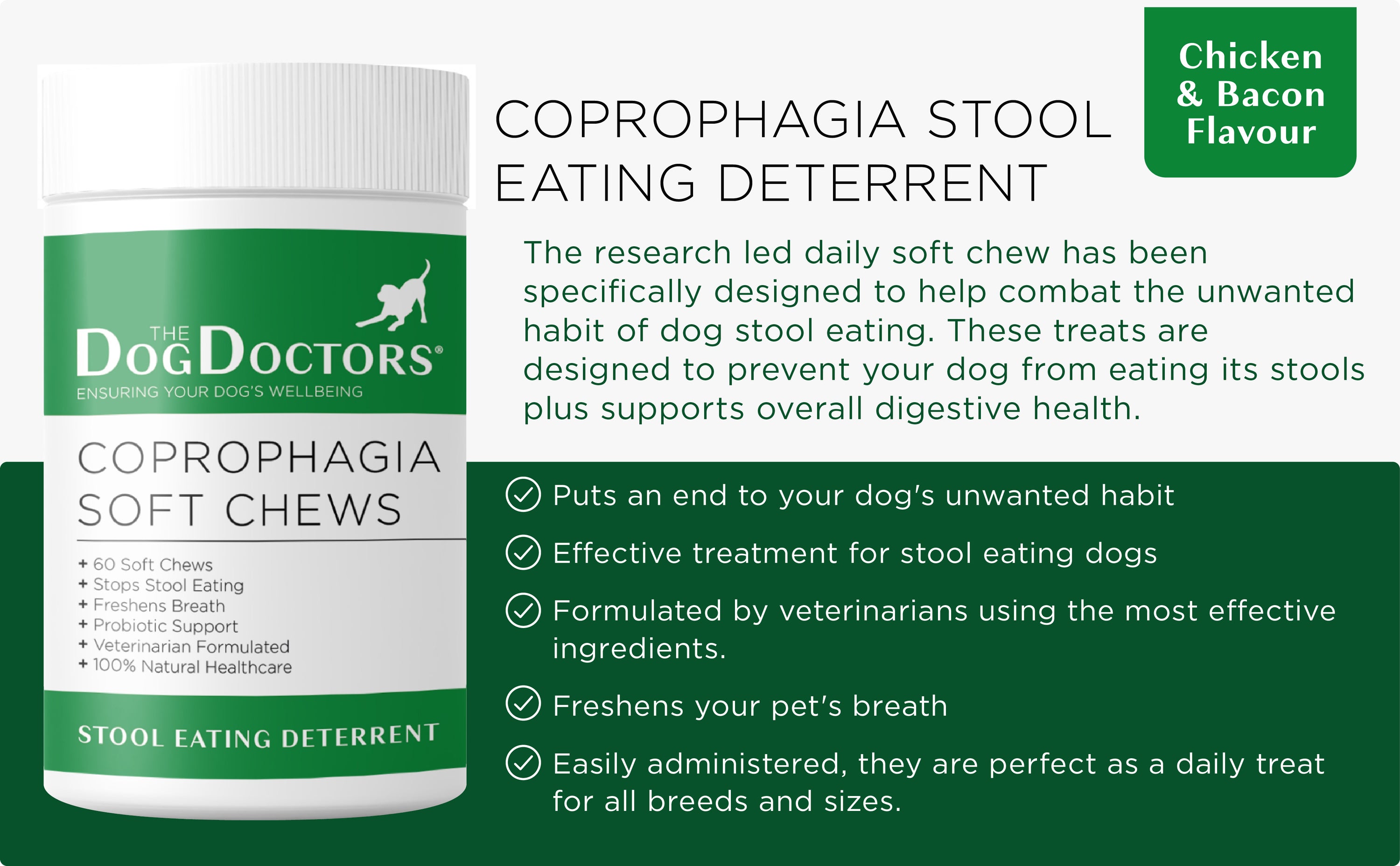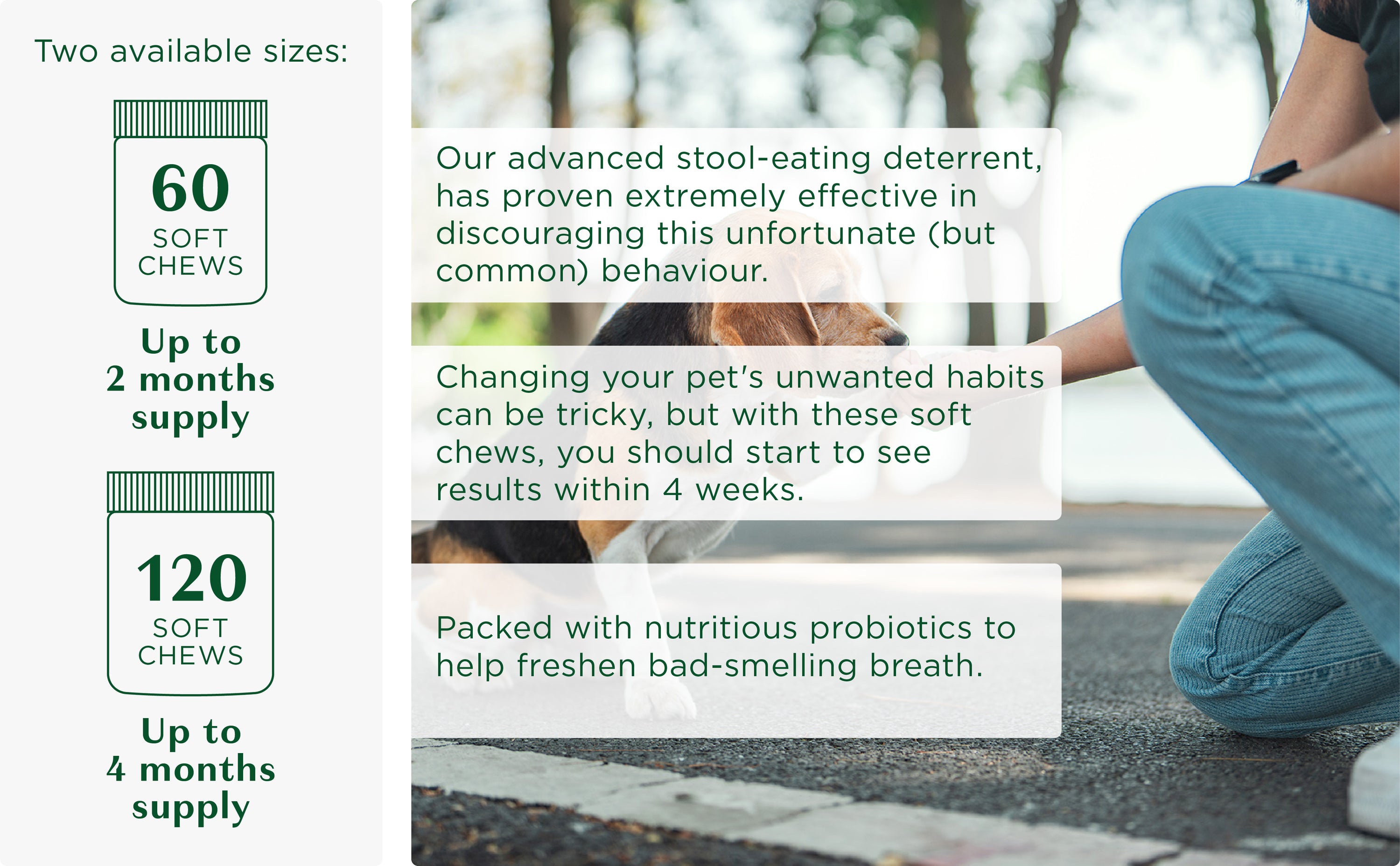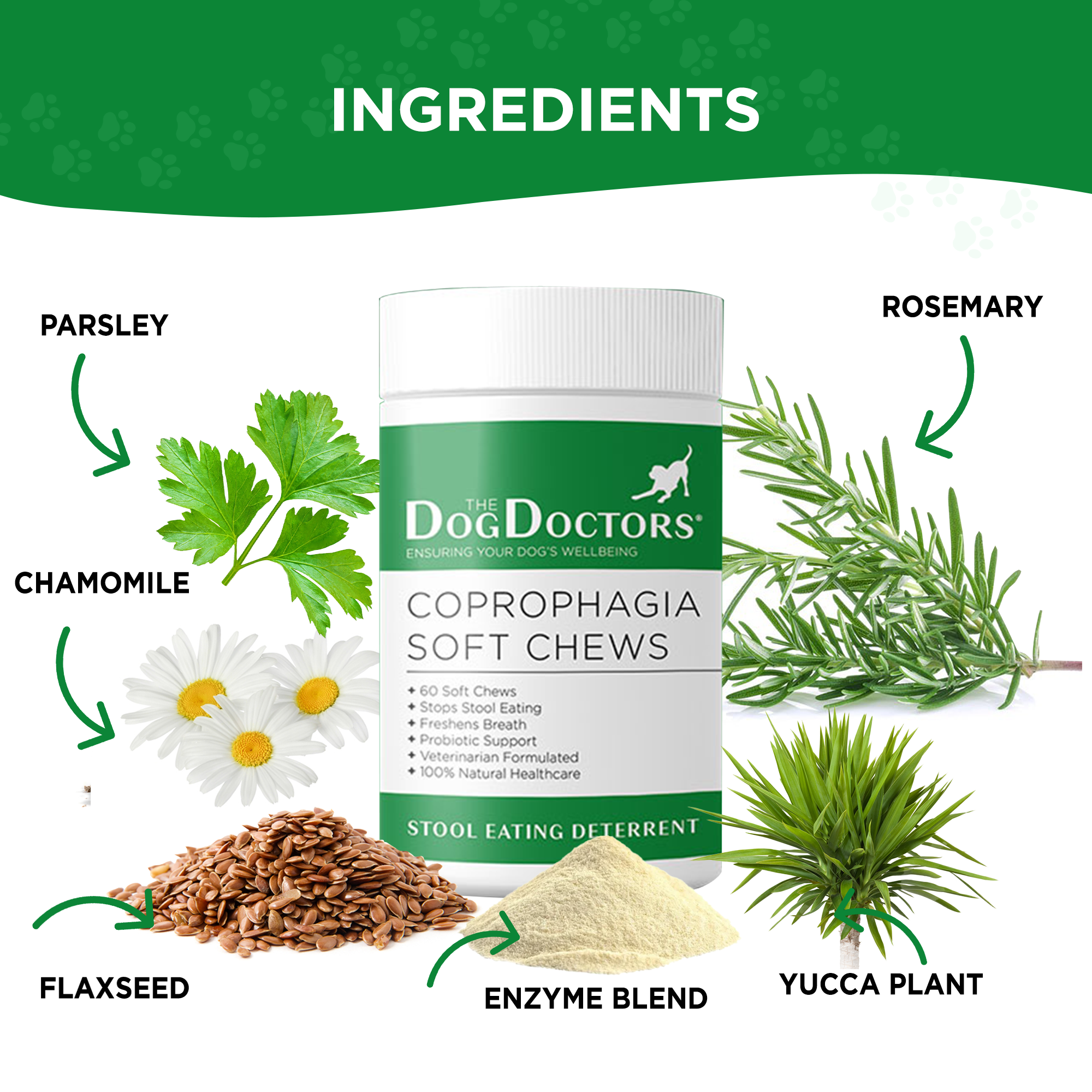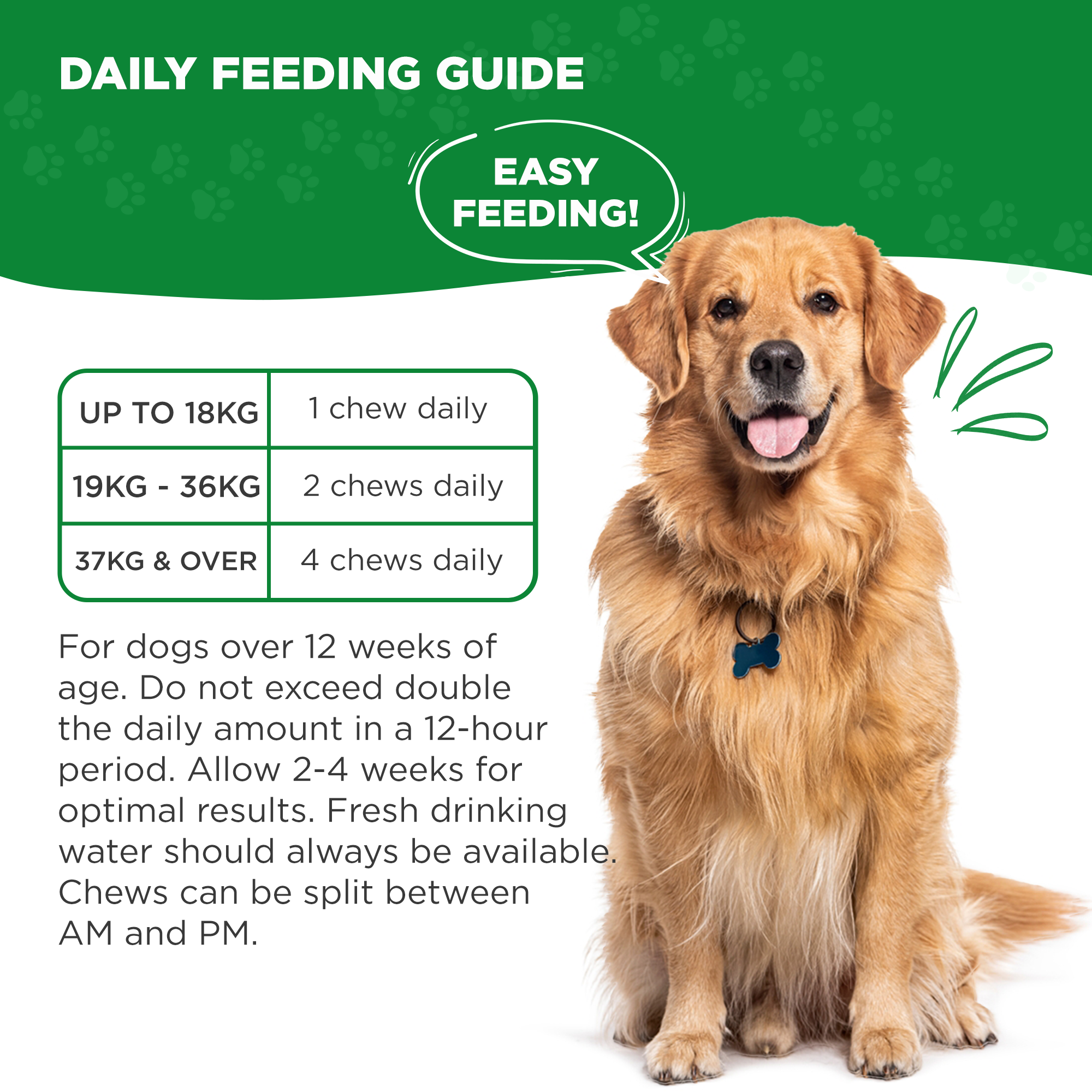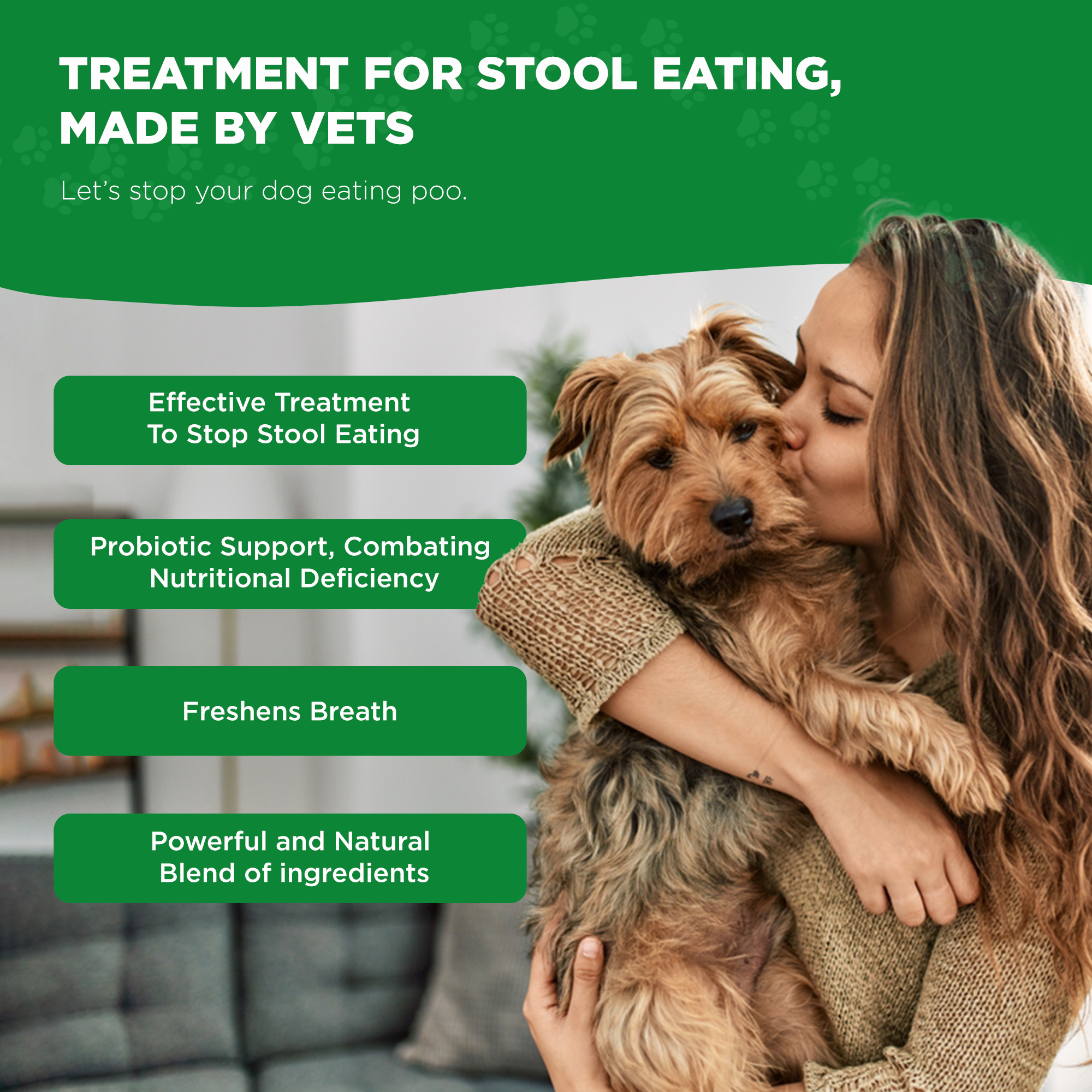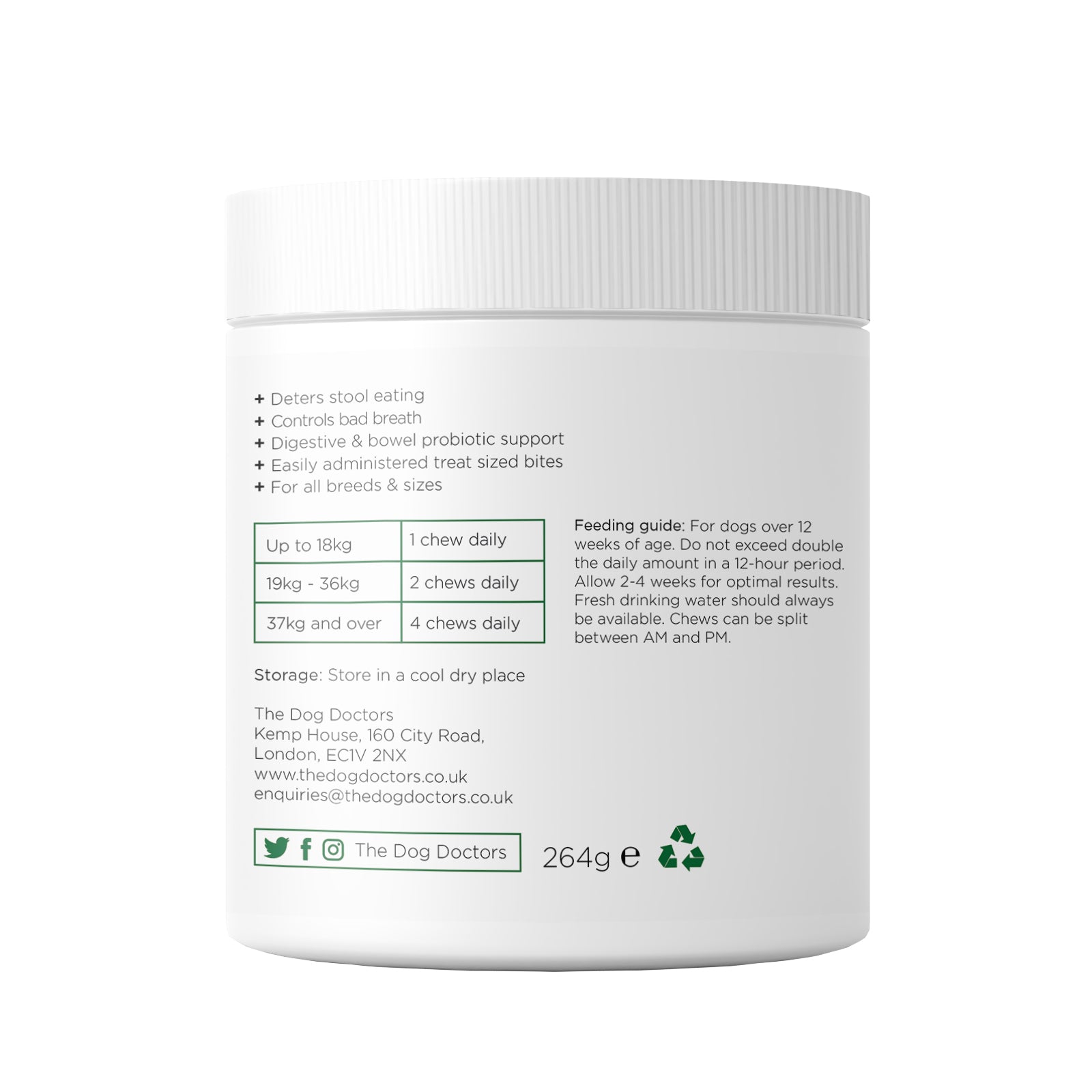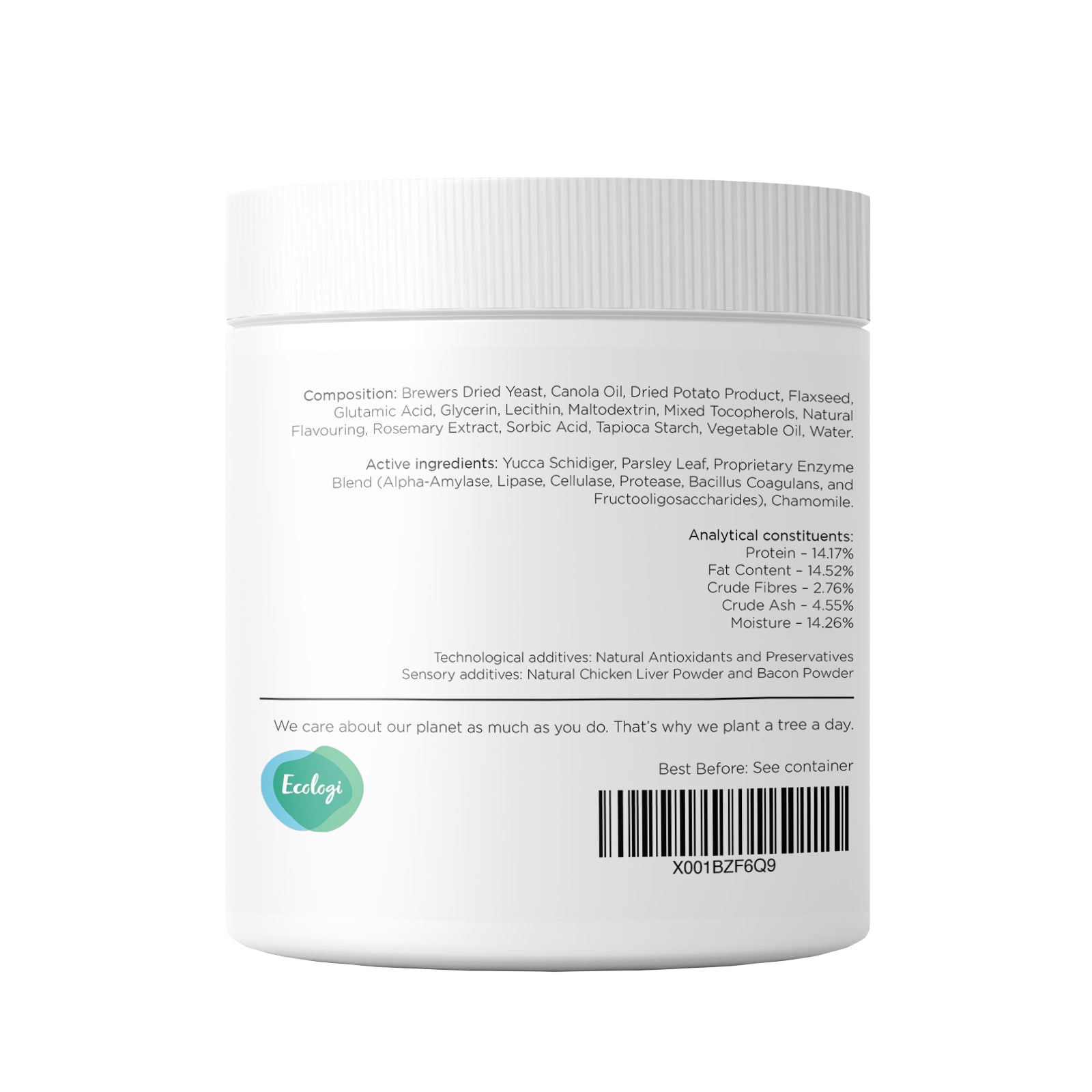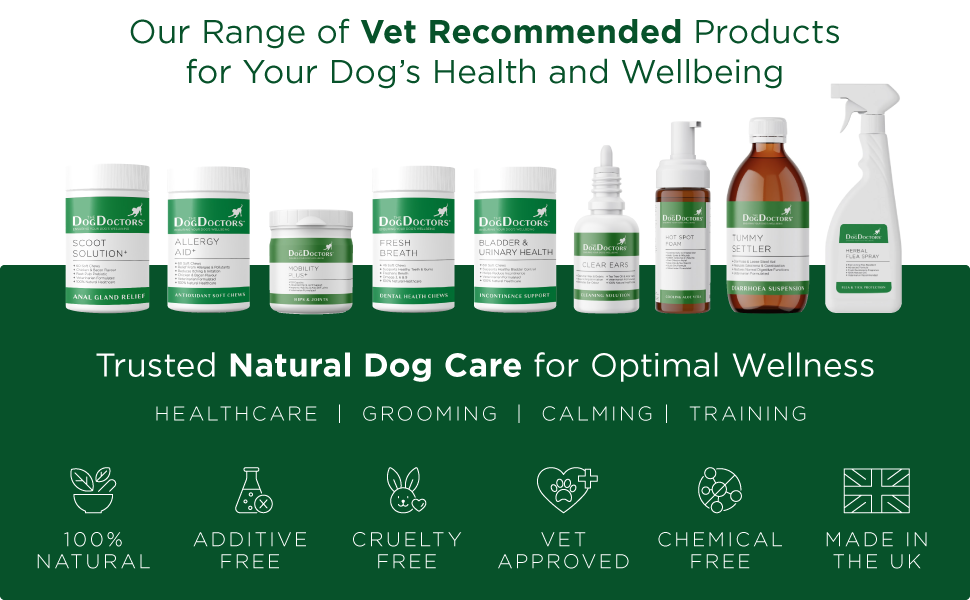Coprophagia Soft Chews - Stool Eating Deterrent
Has your dog developed the horrid habit of eating its stools? We have the natural coprophagia solution your dog needs!
Our best stool eating deterrent for your canine comes in the form of naturally made soft chews with a delicious chicken flavour. These treats are designed to discourage your dog from eating its stools and also act as an anal gland supplement for dogs, supporting overall digestive health. supporting overall digestive health.
- Puts an end to your dog's unwanted habit
- Effective coprophagia solution for dogs and stool eating
- Freshens your pet's breath
- Contains nutritious probiotics and supports dog anal gland health
- Formulated by veterinarians using the most effective ingredients
- Easy-to-administer, chicken-flavoured treat-sized bites
Overview
Stop your dog's unwanted habit with our best stool eating deterrent for dogs.
Veterinarian-formulated with natural ingredients, our advanced stool-eating deterrent, Coprophagia Soft Chews, has proven extremely effective in discouraging this unfortunate (but common) behaviour. They also contain nutritious probiotics to help freshen bad-smelling breath.
Changing your pet's unwanted habits can be tricky, but with these soft chews, you should start to see results within 2-4 weeks.
Ingredients
Composition:
Brewers Dried Yeast, Canola Oil, Dried Potato Product, Flaxseed, Glutamic Acid, Glycerin, Lecithin, Maltodextrin, Mixed Tocopherols, Natural Flavouring, Rosemary Extract, Sorbic Acid, Tapioca Starch, Vegetable Oil, Water.
Active ingredients:
Yucca Schidigera, Parsley Leaf, Proprietary Enzyme Blend (alpha-Amylase, Lipase, Cellulase, Protease, Bacillus Coagulans, and Fructooligosaccharides), Chamomile, Natural Chicken Liver & Bacon Flavouring.
Analytical constituents:
- Protein: 14.17%
- Fat Content: 14.52%
- Crude Fibres: 2.76%
- Crude Ash: 4.55%
- Moisture: 14.26%
Containing a special combination of all-natural ingredients, the chews are veterinary-formulated specifically to deter your dog from eating poop and provides digestive support, including dog anal gland health. This makes it the best stool eating deterrent for dogs and a dual-purpose anal gland supplement for dogs.
- Yucca Schidigera
The Yucca is a herbaceous plant from the lily family, native to desert regions. Scents attract dogs, and the Yucca plant helps to control the smell of stools by altering hydrogen sulphide production in your pet's gut and reducing ammonia production. This process diminishes the noxious aroma that attracts dogs to their stools.
- Proprietary Enzyme Blend
These easy-to-eat soft chews also contain a Proprietary Enzyme Blend. These digestive enzymes, known as nature's catalysts, are crucial for breaking down food in your pup's gut. The enzymes in The Dog Doctors Coprophagia Soft Chews optimize the absorption of nutrients, reducing the likelihood of stool eating as the body no longer lacks important nutrients. This supports the effectiveness of the coprophagia treatment for dogs and enhances overall gut health, which is critical for proper dog anal gland treatment.
Amylase, Protease and Lipase break down carbohydrates, proteins, and fats. Protease is also essential for cell division, blood clotting, immune function, and other vital processes.
Bacillus coagulans is a probiotic bacterium that optimises a healthy gut and aids nutrient absorption.
Fructooligosaccharides support the gastrointestinal tract by balancing the number of beneficial bacteria such as Lactobacillus and Bifidobacterium. This prebiotic also inhibits the growth of bad bacteria, such as E. coli and Clostridium, which cause diarrhoea in dogs.
- Parsley
This plant is considered a 'super herb' for pet nutrition. Its high levels of chlorophyll, which has antibacterial and deodorising properties, help reduce 'doggy breath'. Rich in Vitamins A, C, and K, parsley also supports the immune system, promotes good vision, maintains healthy blood clotting and liver health, and has anti-inflammatory properties.
- Chamomile
This daisy-like plant is a natural relaxing agent that binds to the same cell receptors as tranquillisers. It helps regulate peristalsis in the bowel and is often used to help dogs with diarrhoea and constipation. Chamomile also reduces gastric or abdominal discomfort due to gas or spasms and has antibacterial and antifungal properties.
Guide
For dogs over 12 weeks of age. Do not exceed double the daily amount in a 12-hour period. Allow 2-4 weeks for optimal results. Fresh drinking water should always be available. Chews can be split between AM and PM.
Up to 18kg: 1 Chew daily
19kg - 36kg: 2 Chews daily
37kg and over: 4 Chews daily
Frequently Asked Questions (FAQs)
Q. My dog weighs less than 9kg. How many chews should I give them?
A. For all dogs up to 9kg, please administer 1 Coprophagia Soft Chew regardless of weight.
Q. Is this product safe to use in conjunction with other products?
A. Coprophagia Soft Chews are entirely safe to use alongside other products as they only contain natural ingredients and are designed as anal gland chews for dogs.
Q. How do I know if this product is right for my dog?
A. If your dog has the unwanted habit of eating their own or other dogs' stools, this product will help deter this behavior while providing dog anal gland treatment.
Q. How long do Coprophagia Soft Chews take to work?
A. As all dogs are different, result times will vary. Sometimes, it may take a little time for the powerful ingredients to build up in your dog's system, especially if they suffer badly. On average, you should start to see results within 2-4 weeks of recommended daily use.
Q. Can I give Coprophagia Soft Chews to my puppy?
A. Coprophagia Soft Chews are suitable for all dogs over 12 weeks old.
Q. Why do dogs eat poop?
A. Dogs eat poop, a behaviour known as coprophagia, for several reasons:
- Instinctual Behaviour: Dogs may eat poop due to instincts inherited from their ancestors, the wolves, who would eat faeces to keep their dens clean and avoid attracting predators.
- Nutritional Deficiencies: If a dog's diet lacks certain nutrients or digestive enzymes, they may eat poop to try and re-digest undigested nutrients.
- Exploration and Curiosity: Dogs explore the world through their mouths. Poop can be a source of information about other animals' diets and health.
- Medical Conditions: Conditions such as diabetes, Cushing's syndrome, thyroid disease, or parasites can increase hunger, leading to poop eating.
- Attention-Seeking: Dogs may eat poop to gain attention from their owners, even if it results in negative reactions.
- Stress or Anxiety: Dogs under stress or experiencing anxiety may eat poop as a coping mechanism.
If your dog exhibits this behaviour, it is important to consult a veterinarian to rule out any underlying medical issues and receive guidance on appropriate interventions.
Q. Why do dogs eat cat poop?
A. Dogs eat cat poop because it often smells like cat food, which can be appealing due to its high protein content. Additionally, dogs have a highly developed sense of smell and explore the world through their senses. The strong scent of cat faeces can attract dogs, making them curious to investigate and sometimes eat it. Their instincts and exploratory nature also drive this behaviour.
Additional Information
Does your dog enjoy eating poo?
If yes, it's probably at the top of the behaviours you want to stop as soon as possible. The good news is that the Dog Doctors can help you break this common habit called Coprophagia.
While it's normal for new mothers to lick their puppies to urge a bowel movement and clean up by eating the faeces, this should only last about three weeks after birth. However, this often continues into older years, with one in four adult dogs opting to consume poo and one in six considered "serious" stool eaters by a survey conducted by the University of California.
Why is my dog eating poo?
There are numerous theories to explain coprophagia, and a conclusion is still to be made between veterinarians and animal behaviourists. However, these theories fall into two broad categories – behavioural and medical.
Behavioural
It is instinctual for dogs to explore through both their smell and taste buds, so as far as some dogs are concerned, poo ticks the boxes. Consider it a mouthful of useful information, as it tells them about the animal that produced it and their diet.
Evolution is also believed to play a part because a dog's ancestor, the wolf, was both a predator and a food scavenger. While dogs primarily enjoy eating the carcasses of other animals, they will eat just about anything to survive—from plants to garbage and, finally, faeces.
Other forms of behavioural coprophagia are linked to anxiety and attention-seeking from their owners.
Medical
Dogs will receive some nutritional value from undigested matter. A dog that feels they are lacking nutritional value from their diet will commonly look to eat poo, essentially trying to digest nutrients the second time around. This is often the case when dogs have an enzyme deficiency.
Other kinds of deficiencies, such as abnormal nutrient absorption, will also lead to increased appetite from underlying medical issues such as diabetes, Cushing's syndrome, hyperthyroidism (overactive thyroid), or even certain drug treatments (steroids). Other underlying medical issues, such as exocrine pancreatic insufficiency (EPI), a condition in which the pancreas doesn't produce enough digestive enzymes, can also be a cause. You should contact your veterinarian if you suspect any underlying health issues above.
How can I help my dog?
While supervising and training your dog may be one option, do you have the time? The good news is that there is a much quicker and more effective way. The Dog Doctors Coprophagia Soft Chews can bring results within two to four weeks. They are easily administered bite-sized chews, which your dog will love.
Containing a special combination of all-natural ingredients, the chews are veterinary-formulated specifically to deter your dog from eating poop and provide digestive support.
The Dog Doctors Coprophagia Soft Chews
If you want to stop your dog's unwanted habit, then The Dog Doctors Coprophagia Soft Chews are the perfect aid. Results are commonly seen within 2 – 4 weeks of administration. Remember, every dog is different, so it may take longer for the powerful ingredients to take effect if they are suffering badly. Please contact us with any questions you have. We also offer a 100% satisfaction guarantee, so you can try it risk-free. For more information and to purchase this product, click here.
- All Natural
- Allergy Safe
- Gutproof!
- No Extras

